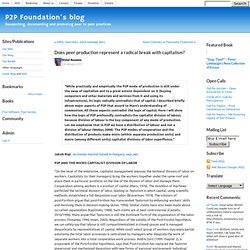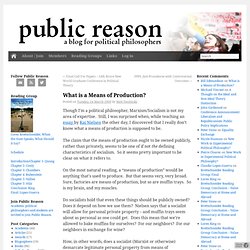

Innovation Isn’t a Matter of Left or Right. Does peer production represent a radical break with capitalism? “While practically and empirically the P2P mode of production is still under the sway of capitalism and to a great extent dependent on it (buying computers and other materials and services from it and using its infrastructure), its logic radically contradicts that of capital.

I described briefly above major aspects of P2P that accord to Marx’s understanding of communism. All these aspects contradict the logic of capital. Peer-to-peer and Marxism: The Berlin Debate. On May 3, Jonathan Clyne, Lena Hanno, Alex Dirmeier and Jean Lievens had a discussion with Michel Bauwens on peer-to-peer and Marxism.

The discussion took place in the lobby of the Palace Hotel in Berlin. Here’s a slightly edited transcript of the discussion. The recording was reasonably good, but our voices were sometimes unintelligible because there were other guests talking in the lobby and there was also a piano playing (from the theme song from Titanic to What a Wonderful World, all very appropriate). So my apologies if I misinterpreted some of the interventions, because sometimes I had to guess what has actually been said (words between parentheses are added). If that was the case, please react so I can change it. Michel started the discussion with a summary of his thoughts on peer-to-peer.
So why does that mean that the Marxist theory of revolution is not convincing for me? Today the situation is different because, in my conception, we finally have this new modality. Social production as a new source of economic value creation. Image by opensource.com In this short TED video clip, Yochai Benkler provides a useful framing of what he terms “social production.”

In the past, Benkler argues, prominent transactional frameworks for exchange were largely categorized as follows: Price system: A decentralized, market-based exchange systemFirm hierarchy: A centralized, market-based exchange systemGovernment/non-profit: A centralized, non-market-based exchange system Before the cost of communication dropped precipitously, Benlker suggests that it was too expensive to have a decentralized social production exchange system. Today however, citing open source projects such as SETI@home and Apache, he makes the claim that social sharing and exchange is emerging as a significant and sustained factor of production. Moreover, social production creates a new form of competition for firms who operate in the centralized market-based framework.
Benkler argues that social production is not a fad; it is a fact. Public Reason · What is a Means of Production? Though I’m a political philosopher, Marxism/Socialism is not my area of expertise.

Still, I was surprised when, while teaching an essay by Kai Nielsen the other day, I discovered that I really don’t know what a means of production is supposed to be. The claim that the means of production ought to be owned publicly, rather than privately, seems to be one of if not the defining characteristics of socialism. So it seems pretty important to be clear on what it refers to. On the most natural reading, a “means of production” would be anything that’s used to produce. But that seems very, very broad. Do socialists hold that even these things should be publicly owned? The Wealth of Networks. The Boom of Commons-Based Peer Production. By Christian Siefkes.

In 1991, an undergraduate Finnish computer science student, Linus Torvalds, had a surprising idea: he began to write a new operating system on his PC. His initial goal was to be able to try some things that weren’t possible with the operating systems then available to him. After several months of tinkering, Torvalds noted that he had developed a system that could be useful for others, too. He announced his work on the Internet and asked for feedback about features that people would like to see.
Some weeks later, he put the software online. The software was met with enormous interest, since the operating systems available at that time offered limited possibilities or were very expensive. Today, GNU/Linux is one of the three most popular operating systems (next to Windows and Mac OS), used by millions of people. The success of GNU/Linux is based on the fact that — like all free software — it is a commons that everybody can use, improve, and share.
References Notes 1. Bauwens Joins Ecuador in Planning a Commons-based, Peer Production Economy. Here’s a development that could have enormous global implications for the search for a new commons-based economic paradigm.

Working with an academic partner, the Government of Ecuador has launched a major strategic research project to “fundamentally re-imagine Ecuador” based on the principles of open networks, peer production and commoning. I am thrilled to learn that my dear friend Michel Bauwens, founder of the P2P Foundation and my colleague in the Commons Strategies Group, will be leading the research team for the next ten months. The project seeks to “remake the roots of Ecuador’s economy, setting off a transition into a society of free and open knowledge.”